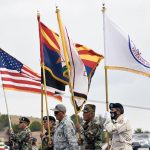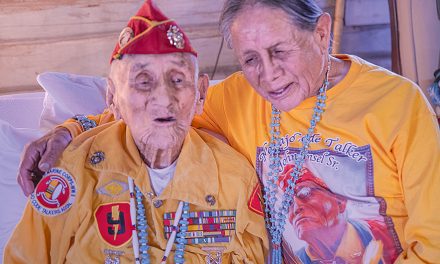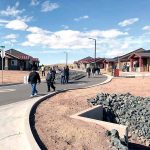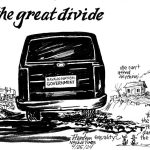
Letters: Thoughts on the end of mining
According to a news report in the Navajo Times (Aug. 22, 2019), today is the last train cars full of coal to the Navajo Generating Station near Page, Arizona – the end of an amazing run for decades catapulting the area into the modern era and prosperity. In many ways, it’s very sad if you’re a resident living in the area for the once rush hour — coalminers rushing —busy going to work or going home from work.
Also, it was exciting to race the train if you’re lucky to be passing by the run, especially at night glittering with lights on the sides of the train to its destination east or west. I am saddened for the hundreds and hundreds of coalmine workers who provided energy for near and far. In return coalminers provided for themselves and family, the area prospered and the economy grew as a result of keeping the dollar here.
The residents enjoyed the warmth of the coal in the cold winter months. Will this amazing feat ever be matched or replicated? This once-in-a-life opportunity stems from various Navajo Nation leaders such as Peterson Zah, et al. The excitement of hearing Chairman Zah landing at Peabody Airport for his excursion to a Kayenta event or my grandson catching a flight from Northern Arizona University in Flagstaff, coming home for vacation.
My grandson’s dad and nali used to work for Peabody mines. This was his connection to catch a flight home. Many other dignitaries and coalminers’ family members landed at the airport. The new era of clean energy renewables exploration and implementation has begun under the new Navajo Nation administration.
Many jobs, education, energy for many families, infusing the local economy, and livelihood of families must be created. Certainly, families that are directly affected are looking to the new leaders.
Right now, it appears the new renewable energy legislation is entangled in confusion and clarity: “Back to the drawing board” (Navajo Times, July 25, 2019), for the Navajo Council’s consideration for passage in the next session. The coalminers are the heroes to countless humanity for providing energy — wow, what a run.
You need to be proud of your contribution to society, homes, near and far. In my recommendation to Navajo Nation Council Speaker Seth Damon, when he called for recommendations on “What will sustain our nation for the next seven generations?” in an area newspaper, I stated to keep the fossil fuel energy in the mix with renewable energy.
Perhaps until clean renewable energy initiative takes off like Peabody coal mining did. This must be major challenge for our Nation and leaders. What happens soon when the whole operation completely shuts down in November/December, such as who is responsible for reclaiming the landscape, the railroad, the rail to the coal tower, new jobs for the miners, or the facilities? And make the whole area booming, again. This is the real challenge.
Thank you, coalminers, for what you did and an appreciation to Navajo Council delegates Hon. Nathaniel Brown and Hon. Herman Daniels, et al, for their initiative to keep NGS operating.
Eugene Charley
Kayenta, Ariz.
Ban cigarettes, liquor instead
Funny that the president wants to ban candy at the fair parade. If he is so concerned about the health and well-being of the Diné people he should start with banning cigarettes and liquor at all Navajo casinos. That kills more Navajos than anything else.
Trey King
Shiprock, N.M.
NTEC doing its job with mine buy
Recently, the Navajo Transitional Energy Company exceeded everyone’s expectations with the purchase of assets from Cloud Peak Energy in Wyoming. Now, some people may have thought, “What the heck are these guys doing? They should have bought NGS and saved jobs on the Navajo Nation, not up there in Wyoming.”
Before you judge their decision, you should read the following. First of all, NTEC did exactly what they were told. They were asked to follow the 2013 Navajo Nation Energy Policy and maximize their efforts to take the “leadership role in exploring and developing its energy resources to exercise its political sovereignty, to build economic sovereignty, and to promote greater self-determination for future generations of Diné.”
That led them to Cloud Peak Energy. They tried purchasing NGS but Council voted to not assist them when NTEC pointedly asked for their help to move negotiations forward. SRP just told the Navajo Nation Council and President Nez to give up any hope of acquiring NGS. Council listened to SRP and Navajo activists, which has led the Navajo Nation to lose those valuable jobs. In fact, Council told Kayenta miners that they should be ashamed for allowing their kids to wear T-shirts that supported their parents’ efforts to save their jobs.
Now NTEC is being condemned for succeeding by those same “leaders” that killed 800 jobs and lost $900 million. Kayenta Mine closed this week. Ask those displaced workers how they feel about Council doing their jobs. Ask them where President Nez was when they needed his help. Seems like our Navajo “leaders” are out of touch with their people. What have they done in their first eight months on the job? Did they create any jobs? Did they enhance any positions?
All I can recall is that the Council did kill 800 jobs and lose $900 million before asking for an additional $900,000 for their Council budget. Further, the president has now dictated to us that we can’t have candy at the parade. NTEC’s efforts should be celebrated because they aren’t asking the Navajo Nation for any money.
In fact, they are making more money for the Navajo Nation. They are simply doing their job. Council and President Nez should do theirs.
Jarvis Williams
Kayenta, Ariz.
Metamorphosis is in order
The United States is currently undergoing a paradigm shift. This “paradigm” understood as “the structure that has unwritten rules which govern reactions,” as predicted by some, but not as expected, with cynicism. This shift is where the former standard loses its influences and flavor, as another takes over.
It seems it was initiated with the grumbling of Mother Earth and outrage of Father Sky. When it began it induced profound fear into the psyche of certain people, which shifted to the social behavior and conduct of the dominant society. And by the looks of it, it will only get worse before it gets better.
This we see now in the idiosyncrasies of ethnic profiling, tactless blabbing, compulsion for brutal violence, no punishment, nor discipline for atrocious offenses, etc. Such madness and chaos create stench of suspicion and suffocation from paranoia, with people yearning not to become a statistic. With chivalry, common courtesy, and etiquette in exile, now comes hatred, annihilation and denial of freedom with duration unknown. And on our reservation these agitations and atrocities of the dominant society may seem distant and as nothing new to our obliviousness and stubbornness.
For the few, if we put aside our pretend-amnesiac attitude of indifference, perhaps we may remember something from our collective past that may help us resolve our own chaotic conditions. For our majority they are diligently working out the puzzles of our cellular dysfunctions, childhood disturbances, disengaging from dependent-conditioning, and challenging the profound hauntings of The Long Walk. Then there is the absurd and amusing misconception of politics by the brazen elected few who unequivocally believe that it is all about them.
Obviously they clearly do not understand the impartial role of servitude for social change, which is not about get-rich quick schemes, but is what it is, a process of service to others.
Let us take it down a notch to where real problems dwell and explore personal change as transformation (healing) in metaphoric terms. Real metamorphosis is not sweet and easy. It begins with self as it spirals down into a cold, dark murky void. There it slowly oozes with painful movement and paralyzing fear while seeking an escape.
It is unraveling tangled webs of long-forgotten lies and self-deceptions, while listening to unsettling screams and outcries somewhere in distant darkness. Further, facing our own-created vicious monsters and demons that feed in our cavernous mind-dump. This is a life or death struggle between ego of mind and will of soul.
And if we do not get lost, go mad or self-destruct there is the breakthrough, a liberation by the delicate light of forgiveness of self. Perhaps time to pass the helm to our essence (heart-soul) to run the show?
From blossoming comes divine blessing chants of renewed spirit. What follows is an open mind, physical vitality, keenness of senses, and reclaiming our gifts of free will and creativity. Only then will we realize the moment of now and take flight, to soothe in true freedom, an exercise in compassion.
Understand this scenario is not wishful thinking nor New Age. Once in our distant past this was culture and tradition. Throughout centuries our genuine medicine people with focused energy (consciousness) conducted such transformations in their healing rituals by guiding their patients through mythic journeys and legendary battles beyond time and space. On their joint return they took a new route, bypassed and overcame afflictions, thus rebalanced and synchronized spirit-mind-body of the patient, to a healthy, alert state. Indeed, only if and when we grow in freedom can we create a new world through creativity, which is our innate energy expressions.
Robert L. Hosteen
Beclabito, N.M.
On wannabe Natives, veterans
Ms. Elizabeth Warren has some issues for sure and they’re not good. She’s a Native American “wannabe” but only when it favors her or makes her appear to be special. Native Americans are and have been discriminated against as long as the United States has existed, but people like Ms. Warren never step up to help them.
Why people like Ms. Warren want to be someone they are not is anyone’s guess, but most of the time it happens when one is immature or insecure in their own skin. In 2019, especially this country and throughout the world, we are loaded with narcissistic people, athletes, entertainers, and politicians that are about “look at me, look at me, look at me.”
Sen. Elizabeth Warren is no different.
All of our military veterans can relate, especially our Vietnam veterans. I told a Native American organization this and at first the person I was talking to was puzzled. During the time frame of the Vietnam War — Aug. 5, 1964 to May 7, 1975 — 9,087,000 military personnel served on active duty. National Guard members don’t count unless they volunteered for Vietnam, but only 2,709,918 Americans served in uniform in Vietnam, not all that many.
How I ended up in Vietnam as an 18-year-old infantryman I still don’t know, but I met some great men and women there, the best. Two hundred forty men were awarded the Medal of Honor during the Vietnam War and 1,713,823 of those who served in Vietnam were still alive as of August 1995 (Census figures).
During that same Census count, the number of Americans falsely claiming to have served was 9,492,958 – “wannabes.” As of the Census taken during August 2000, the surviving U.S. Vietnam Veteran population estimate was 1,002,511. This is hard to believe, losing nearly 711,000 between 1995 and 2000. That’s 390 per day. During this Census count, the number of Americans falsely claiming to have served in country is 13,853,027.
By this Census, four out of five who claim to be Vietnam vets are not. This makes calculations of those alive, even in 2017, difficult to maintain. Vietnam veterans were hammered by their fellow Americans when they came home and I still get verbally abused at times, even at 67 years old, on blogs such as “The Hill.”
Native Americans have been getting hammered by Americans since this country became occupied by the English settlers who by today’s standards entered the Native Americans’ land illegally (undocumented). Raping their land, taking their food, jobs, and way of life away from them.
So Ms. Warren was totally out of line when she lied to falsely claim she was a Native American when she has never been discriminated against or verbally abused by people that are basically trespassing on the Native Americans’ land, even in 2019. Things were good until people from England came here and messed it up for the Native Americans. Good, bad, or indifferent, this land was their land, not your land. Many of you won’t even serve to defend it but still think you own it.
Twenty-seven Native Americans have been awarded the Medal of Honor, the nation’s highest military honor. I tell everyone, “I want to be the oldest living Vietnam veteran one day.” If that happens, I can show my fellow big-mouthed Americans my middle finger as I leave this earth. I can only imagine how disrespected the Native Americans must feel. I’m sorry for that, too.
The military depends on a constant flow of volunteers every year. According to the 2017 Pentagon data, 71 percent of young Americans between 17 and 24 are ineligible to serve in the United States military. Put another way: Over 24 million of the 34 million people of that age group cannot join the Armed Forces — even if they wanted to. This is an alarming situation that threatens the country’s fundamental national security.
If only 29 percent of the nation’s young adults are qualified to serve, and if this trend continues, it is inevitable that the U.S. military will suffer from a lack of manpower. A manpower shortage in the U.S. Armed Forces directly compromises national security.
Mike Archer
Benson, Ariz.
Set up toll roads for roads used by companies
I am writing this letter regarding my recent experience commuting on San Juan County Road 7900, a secondary road between Highway 550 and Pueblo Pintado in New Mexico.
This road has become a veritable freeway for oil companies in our Navajo communities of Pueblo Pintado, Counselor, Ojo Encino, and Torreon. The road is one of several secondary roads negatively impacted by heavy industrial traffic that is destroying both paved and dirt roads in our communities. When I traveled CR 7900 last week, I got a flat tire that was beyond repair. The tire was punctured by a sharp rock imbedded in the road’s surface.
Like many Navajo people, I drive a truck because I live in an isolated area. Truck tires are expensive to replace, and are not covered by insurance comprehensive policies, even though the roads we need to use have been damaged, almost beyond repair, by corporate in industrial forces beyond our control as tribal members.
One does not have to drive very far on any secondary road in this geographic area to experience the potholes, ruts, and nearly impassible road surfaces we’re forced to travel to buy food, get to and from work, haul water for livestock, and visit our children’s schools. I wonder how many other community members have encountered significant problems on local secondary roads while vehicles owned by wealthy oil companies are given a free ride to destroy local lands and existing infrastructure.
I am told that oil company vehicles are even making other roads, instead of continuing to use county roads made nearly impassible by their drilling rigs, chemical trucks and other heavy equipment. Regardless of where these trucks are, they move down the center of a road and do not make way for oncoming traffic.
This practice forces local residents to pull off into the ditches to avoid being hit. Our secondary roads on the Checkerboard Reservation are there for the public to use. They are supposed to be maintained by both the Navajo Nation and the New Mexico counties in which the roads are located. However, both the counties and the Navajo Nation have areas they do not grade or maintain.
When oil companies drill on the reservation, they do nothing to abate road damage, either while working in an area, or once their work is completed. It feels as though our Navajo communities have been invaded by mendacious corporate forces that give nothing in exchange for the riches they take from us. Instead, we are left with ruined roads that are dangerous for us and our children to use while engaging in the activities of daily life here.
In view of these concerns, I recommend that companies who do business in Navajo Country and surrounding areas pay a toll directly to local communities, to defray the cost to maintain these roads that were not constructed for heavy loads and equipment. (A toll road, also known as a turnpike or tollway, is a public or private road for which a fee is assessed for passage. It is a form of road pricing typically implemented to help recoup the cost of road construction and maintenance.)
Rena D. Castillo
Ojo Encino Chapter, N.M.








 Highway 264,
Highway 264, I-40, WB @ Winslow
I-40, WB @ Winslow